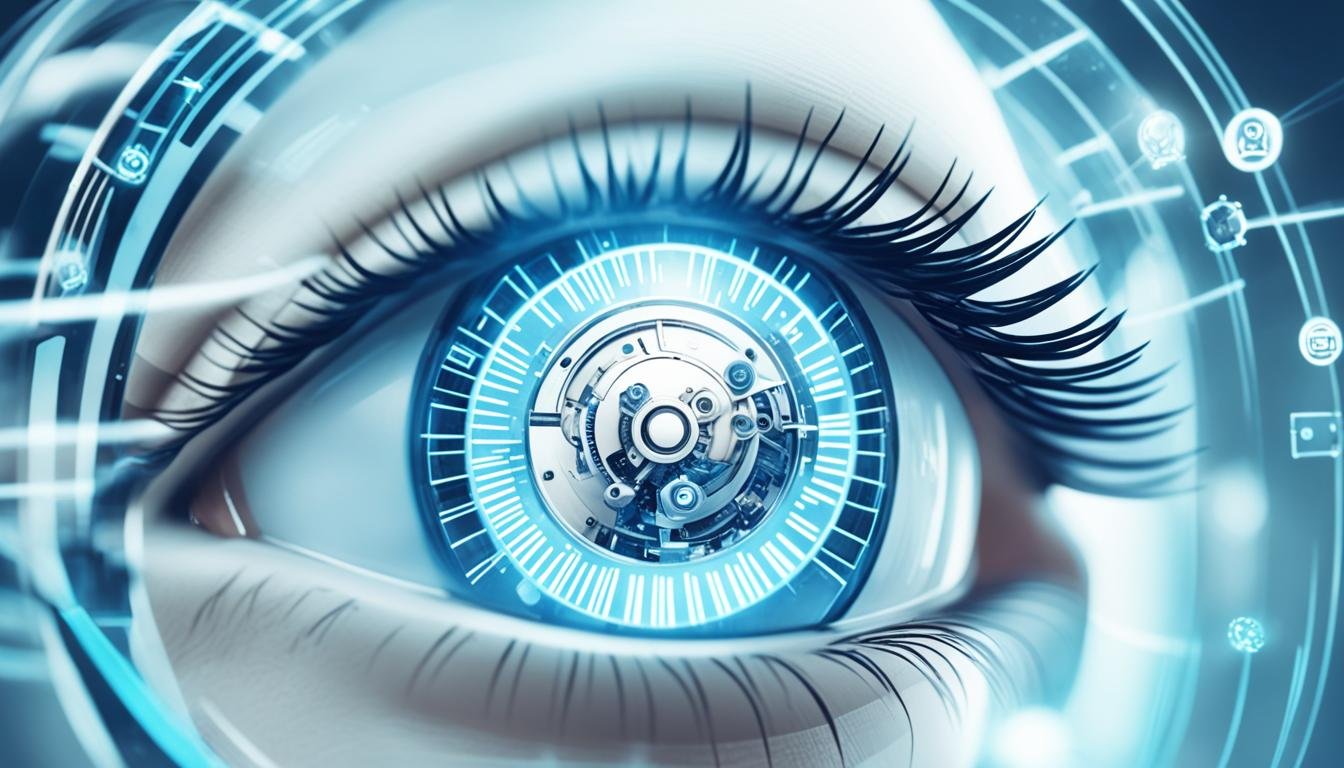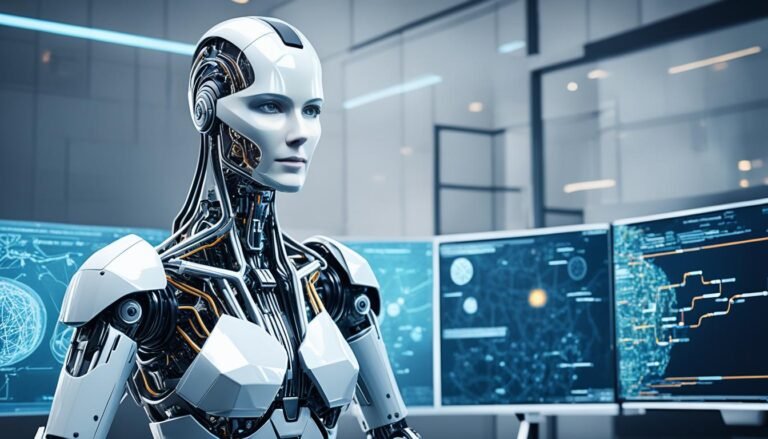Ethical AI: Discussions on the ethical implications of AI technologies.
Did you know that global business spending on Artificial Intelligence (AI) is set to hit $50 billion this year? By 2024, it’s expected to jump to $110 billion annually. AI is becoming a big deal in many industries, offering huge benefits. But, as companies use AI to make big decisions, worries about its ethics have grown.
AI is now involved in healthcare, jobs, and even criminal justice, affecting people’s lives deeply. But, there’s a big issue: these AI systems lack transparency and accountability. This means biases or discrimination in these algorithms can go unnoticed. Now, we’re talking a lot about ethics, governance, and trust in AI.
Key Takeaways:
- Ethical AI is everywhere, with global spending expected to hit $50 billion this year.
- AI’s role in big decisions like healthcare, jobs, and justice raises bias and discrimination concerns.
- Transparency, accountability, and trust are key to fixing AI’s issues.
- Ensuring AI is ethical means focusing on ethics, governance, and responsible AI use.
- As AI grows, we need strong laws and rules to manage it properly.
The Three Major Ethical Concerns in AI Technologies
AI technologies bring up three big ethical worries: bias and discrimination, transparency and accountability, and the role of human judgment.
AI learns from a lot of data. If this data has biases, the AI can too. To fix this, we need to work on making AI fair. This means getting rid of biases in the data and the algorithms.
Not knowing how AI makes decisions is another big issue. It’s hard to see why AI makes certain choices. This makes us worry about who is responsible. To fix this, we’re working on making AI clearer and more understandable.
Finally, we need to make sure humans still play a part in using AI. AI can help make decisions, but humans should check these decisions. This helps avoid mistakes and biases from AI.
We must focus on making AI clear, responsible, fair, and unbiased. By doing this, we can make sure AI is used in a good way.
Addressing Ethical Challenges in AI Technologies
Dealing with AI’s ethical issues needs teamwork among tech experts, policy makers, ethicists, and everyone in society. A big focus is on AI Privacy Protection. AI needs lots of personal data, which makes people worry about privacy and misuse.
To solve this, we must create strong rules for Ethical AI and Responsible AI Development. These rules help make sure AI respects people’s privacy and rights. They also make sure AI is open and accountable in how it makes decisions.
Responsible AI development means thinking about ethics from start to finish of AI systems. It’s about checking for biases, discrimination, and bad effects that AI might cause.
It’s also key to keep talking about AI ethics to understand its ethical sides. These talks help shape AI’s future in a way that’s good for society. They help make ethical AI frameworks and rules for companies and policy makers.
By focusing on AI Privacy Protection, using Ethical AI frameworks, and following Responsible AI Development rules, we can make AI that respects human values. It will protect privacy and help society.
Stay tuned for the next section where we explore the impact of AI on the workforce.
The Impact of AI on the Workforce
The growth of AI has made people worry about AI job displacement and its effects on jobs. AI could create more jobs than it replaces, but there’s a fear it will cause widespread job loss. This could make economic inequality worse.
We need to be aware of how AI might change the job market. To lessen its bad effects, we should focus on retraining programs. These programs help workers get the skills they need for the new job world brought on by AI.
But, we can’t just rely on retraining. We need a full plan that includes policies and support for workers losing their jobs to AI. Social and economic support systems are key. They provide financial help, healthcare, and more to those losing jobs due to AI.
“Proactive measures, such as retraining programs and policies that facilitate a just transition for affected workers, as well as social and economic support systems, are essential to address the impacts of job displacement and ensure a fair and equitable future of work in the AI era.”
Putting workers’ well-being and jobs first can lessen the bad sides of AI job loss. We need government, schools, and businesses to work together. This way, we can make a future where everyone can do well, even with AI changing jobs.
Legal and Regulatory Considerations for AI Technologies
AI has changed many industries, making things more efficient and innovative. But, it also brings legal and regulatory challenges. These need to be tackled to make sure AI is used responsibly and ethically.
AI Regulation
AI’s fast growth means we need rules for its use. The U.S. doesn’t have specific AI laws yet, leading to a patchwork of legal rules. This makes it hard for businesses and people to know the legal side of using AI.
AI Legal Implications
AI brings up legal issues like copyright, privacy, and work rules. Using AI to copy material without permission can break copyright laws. Keeping personal data safe is key, as AI uses a lot of it. We need clear rules to protect privacy and stop misuse. AI also changes jobs, bringing up questions about fair treatment and job loss.
International Perspective
Other countries are moving fast on AI laws. Europe has the AI Act, a detailed AI law. It sets rules for making and using AI. Working together globally is important to make AI ethics and rules the same everywhere.
To tackle AI’s legal and regulatory issues, we need a strong framework. This should protect people’s rights and encourage innovation. It should have clear rules for copyright, privacy, and work laws with AI. We also need to keep an eye on AI, auditing and making sure it follows the rules.
The Role of AI Ethics Boards
AI ethics boards are key in making AI rules. These boards have experts from different areas. They give advice on legal and ethical matters. Working with industry leaders, lawmakers, and legal experts can help make good rules. These rules should balance innovation, public interest, and ethics.
AI is always changing, so we need to keep updating our rules. With the right legal and regulatory frameworks, we can use AI’s benefits. And we can protect the rights and interests of everyone and society.
Conclusion
Ethical AI talks are key to making AI technologies responsible. We must tackle issues like bias, privacy, and job loss together. By talking, making rules, and working together, we can use AI’s power without losing our values.
We need to keep looking at how AI affects us to make sure it’s good for everyone. We can fix AI’s biases and make its decisions clear. Protecting our privacy and helping workers who lose jobs are also important. Laws and rules will help us use AI right.
As AI grows, we must think about its right and wrong sides. We need to keep checking, working together, and changing to make AI good for all. Let’s aim for an AI future that’s fair, open, and ethical.







